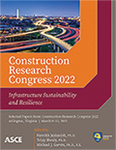Exploring Challenges to Implement an Integrated Urban Infrastructure Management Approach
Publication: Construction Research Congress 2022
ABSTRACT
As infrastructure systems are interdependent, the disruption of one infrastructure system may generate cascading impacts on other infrastructure systems. Thus, becoming necessary to adopt an integrative approach to manage multiple infrastructure systems. However, the interaction between multiple infrastructure agencies may place challenges for developing an integrated management approach. This study aims to identify existing challenges in agencies managing urban infrastructure systems to implement an integrated management approach, namely, water, wastewater, stormwater, and transportation infrastructure. The authors carried out 11 semi-structured interviews during 2020 and 2021 with multiple stakeholders involved in managing water, wastewater, stormwater, and transportation systems in Chile that were qualitatively analyzed. The results revealed that the legal framework, limited workforce, and limited coordination protocols among agencies limit the implementation of an integrated urban infrastructure management approach. Furthermore, our results suggest that there is a high awareness among respondents for challenges related to operational problems (i.e., short-term issues), such as access to information, and human resources. Conversely, long-term challenges, such as policies, strategies, and risk analyses shown a lower awareness by interviewees. Identifying existing challenges faced by agencies managing urban infrastructure systems may assist in developing policies to successfully implementing an integrated infrastructure management approach.
Get full access to this article
View all available purchase options and get full access to this chapter.
REFERENCES
Abu-Samra, S., Ahmed, M., and Amador, L. (2020). “Asset Management Framework for Integrated Municipal Infrastructure”. Journal of Infrastructure Systems, 26(4), 04020039.
Abu Samra, S., Ahmed, M., Hammad, A., and Zayed, T. (2018). “Multiobjective framework for managing municipal integrated infrastructure”. Journal of Construction Engineering and Management, 144(1), 04017091.
Araya, F., Faust, K. M., and Kaminsky, J. A. (2018). Permanent versus Temporary Infrastructure Solutions: Hosting Communities’ Perceptions toward Methods of Provision of Water Services to Displaced Persons in Germany. In Construction Research Congress 2018: Infrastructure and Facility Management. Reston, VA: ASCE,383–392.
Araya, F., Faust, K. M., and Kaminsky, J. A. (2019). “Public perceptions from hosting communities: The impact of displaced persons on critical infrastructure”. Sustainable Cities and Society, 48, 101508.
Araya, F., Faust, K. M., and Kaminsky, J. A. (2020). “A Decision-Making Framework for Participatory Planning: Providing Water Infrastructure Services to Displaced Persons”. In Construction Research Congress 2020: Infrastructure Systems and Sustainability. Reston, VA: ASCE, 654–664.
Araya, F., Faust, K. M., and Kaminsky, J. A. (2021). “Agent-Based Model of Hosting Communities’ Perceptions of Water and Wastewater Infrastructure during the German Refugee Crisis”. Journal of Management in Engineering, 37(4), 04021035.
Faust, K. M., and Kaminsky, J. A. (2017). “Building water and wastewater system resilience to disaster migration: utility perspectives”. Journal of construction engineering and management, 143(8), 04017058.
Grafius, D. R., Varga, L., and Jude, S. (2020). “Infrastructure interdependencies: opportunities from complexity”. Journal of Infrastructure Systems, 26(4), 04020036.
Goodman, A. S., and Hastak, M. (2015). Infrastructure Planning, Engineering, and Economics. McGraw-Hill Education.
Hacker, M. E., Kaminsky, J., Faust, K. M., and Rauch, S. (2020). “Regulatory Enforcement Approaches for Mass Population Displacement”. Journal of Construction Engineering and Management, 146(5), 04020042.
Halfawy, M. R. (2008). “Integration of Municipal Infrastructure Asset Management Processes: Challenges and Solutions”. Journal of Computing in Civil Engineering, 22(3), 216–229.
Halfawy, M. R. (2010). “Municipal information models and federated software architecture for implementing integrated infrastructure management environments”. Automation in Construction, 19(4), 433–446.
Metayer, G., Torres-Machi, C., and Bastias, A. (2020). “A Proposed Framework for the Integrated Management of Municipal Infrastructure”. In Construction Research Congress 2020: Infrastructure Systems and Sustainability. Reston, VA: ASCE, 846–855.
Namey, E., Guest, G., Thairu, L., and Johnson, L. (2008). “Data reduction techniques for large qualitative data sets”. In Handbook for team-based qualitative research, 2(1), 137–161.
Rinaldi, S. M., Peerenboom, J. P., and Kelly, T. K. (2001). “Identifying, Understanding, and Analyzing, Critical Infrastructure Interdependences”. IEEE Control Systems Magazine, 21(6), 11–25.
Saidi, S., Kattan, L., Jayasinghe, P., Hettiaratchi, P., and Taron, J. (2018). “Integrated infrastructure systems—A review”. Sustainable Cities and Society, 36, 1–11.
Sanusi, F., Choi, J., Ulak, M. B., Ozguven, E. E., and Abichou, T. (2020). “Metadata-Based Analysis of Physical–Social–Civic Systems to Develop the Knowledge Base for Hurricane Shelter Planning”. Journal of Management in Engineering, 36(5), 04020041.
Spearing, L. A., and Faust, K. M. (2020). “Cascading system impacts of the 2018 Camp Fire in California: The interdependent provision of infrastructure services to displaced populations”. International Journal of Disaster Risk Reduction, 50, 101822.
Vasquez, S., and Araya, F. (2021). “Identifying the level of development of integrated urban infrastructure management practices in Chile”. In Annual Conference Canadian Society for Civil Engineering, May 26-29.
Yang, Y., Ng, S. T., Xu, F. J., and Skitmore, M. (2018). “Towards sustainable and resilient high-density cities through better integration of infrastructure networks”. Sustainable Cities and Society, 42, 407–422.
Information & Authors
Information
Published In
History
Published online: Mar 7, 2022
Authors
Metrics & Citations
Metrics
Citations
Download citation
If you have the appropriate software installed, you can download article citation data to the citation manager of your choice. Simply select your manager software from the list below and click Download.
